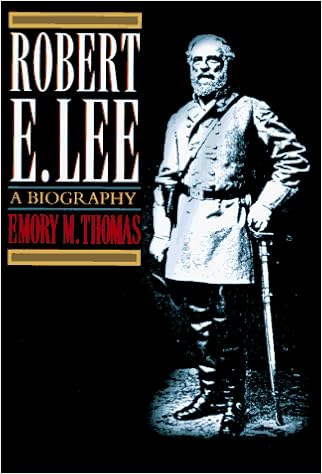
Robert E. Lee: A Biography
Description
From Publishers Weekly Thomas, a distinguished historian of the Civil War (The Confederacy as a Revolutionary Experience), has written a major analytical biography of Robert E. Lee. Synthesizing printed and manuscript sources, he presents Lee as neither the icon of Douglas Southall Freeman nor the flawed figure presented by Thomas Connolly. Lee emerges instead as a man of paradoxes, whose frustrations and tribulations were the basis for his heroism. Lee's work was his play, according to the author, and throughout his life he made the best of his lot. Believing that evil springs from selfishness, he found release in service to his family, his country and, not least, to the men he led. One of history's great captains and most beloved generals, he refused to take himself too seriously. This comic vision of life ultimately shaped an individual who was both more and less than his legend. Highly recommended. Photos not seen by PW. Copyright 1995 Reed Business Information, Inc. From Library Journal Gen. Robert Edward Lee was a leader who inspired great devotion among the men who followed him, and he continues to inspire great interest to this day. Thomas (The Confederate Nation, 1861-1865, 1979) presents a fresh look at the general. By examining Lee as a person, the biographer renders him intensely human. Lee is shown to be the son of an unstable father, a frustrated husband, and a devoted parent. He encountered many hardships but became great not "because of what he did ...but because of the way he lived." Given the prodigious number of Lee biographies available, this may be an optional purchase, but it is nonetheless a valuable addition to the studies of the general.?Robert A. Curtis, Taylor Memorial P.L., Cuyahoga Falls, OhioCopyright 1995 Reed Business Information, Inc. From Booklist Thomas positions this life of the Marble Man as a corrective to critical appraisals such as Alan Nolan's Lee Reconsidered (1991). Both authors must contend with Douglas Southall Freeman's enduring R. E. Lee (1934), so what a revealing delight are Thomas' newly mined nuggets that humanize the image of the imperturbable, heroic, saintly, and suffering Lee. Thomas extracts them from Lee's pre^-Civil War career, when he was mastering battlements (as an engineer) before mastering battles. Family life predominates, especially the legacy of Lee's famed father, "Light Horse" Harry Lee, Washington's cavalry chief, who landed in debtors prison. Thomas makes the case that that disgrace impelled the son on a lifelong, if subconscious, quest to repair by personal example the family name; hence Lee's legendary devotion to honor, duty, and courtesy. Perhaps his unspoken embarrassment was compounded by dependence on others for a living (his wealthy wife, the militaries, a college). The war narratives are professionally rendered (Thomas is many times an acclaimed Civil War author), but always in focus is the shy, conflict-avoiding Lee personality, excepting conflicts at the Seven Days and elsewhere, of course. Be Lee traitor or patriot, he is a compelling American figure. This fine work is an obligatory acquisition. Gilbert Taylor Emory Thomas is Regent's Professor of History at the University of Georgia. Read more
Features & Highlights
- Providing a thorough examination of the life of Robert E. Lee, a biography finds meaning in Lee's successes and failures and portrays him as a man struggling with personal inner torments who found release in the responsibilities of war.





